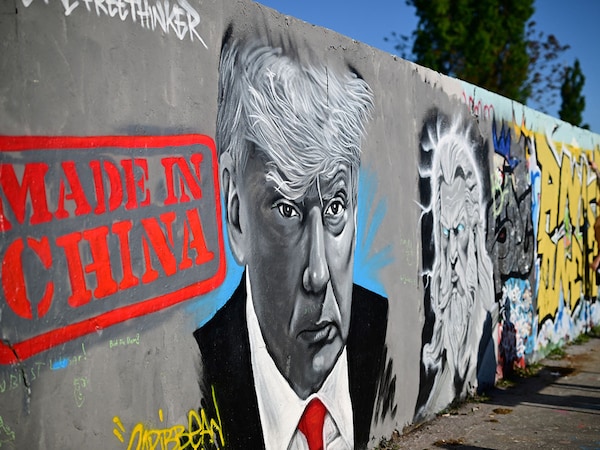Companies turn to stockpiling in US amid Trump trade war
Whether it's the luxury, electronics or pharmaceutical sectors, US President Donald Trump's unpredictability complicates the calculations of firms


Stockpiling is the reflex response by firms to the imposition of tariffs, but with the rapidly-changing position of the Trump administration, companies are finding that it isn"t so straightforward this time around.
Whether it"s the luxury, electronics or pharmaceutical sectors, US President Donald Trump"s unpredictability complicates the calculations of firms.
Some companies didn"t wait for Trump"s April 2 announcement of massive "reciprocal" trade tariffs: they had already begun shipping more of their goods to the United States.
In the end, Trump backed down quickly on the "reciprocal" tariffs, pausing them for 90 days except for China.
That still left the global 10 percent tariff in place, as well as the 25 percent tariffs on European steel, aluminium and cars.
French cosmetics firm Clarins didn"t hesitate and stepped up shipments to the United States at the beginning of the year.
"We"ve built up three months of stocks, which represents $2 million in goods," said Lionel Uzan, the head of Clarins"s US operations.
With all of its products made in France, Clarins had few other options to mitigate the tariffs.
Even if they don"t all acknowledge it so openly, firms in many different sectors are stockpiling their products in the United States.
In March, exports of Swiss watches to the United States jumped nearly 14 percent compared to the same month last year.
More striking is Ireland, which plays host to a number of international pharmaceutical firms.
Its exports to the United States jumped 210 percent in February to nearly 13 billion euros ($14.8 billion), with 90 percent of those being pharmaceutical products and chemical ingredients.
It stepped up production in January and February.
"We"ve sent around 30 percent of our extra stock to the United States," said the company"s chief executive, Baptiste Reybier.
That extra production has benefitted transportation firms.
Lufthansa Cargo said it has seen in recent weeks "an increase in demand for shipments to the United States".
The trade war "has incited companies to accelerate certain stages in their supply chains", it told AFP.
"A similar trend was seen for the delivery of cars from the EU to the United States," it said.
The phenomenon also concerns US-made goods.
The Japanese newspaper Nikkei reported recently that Chinese tech firms were snapping up billions of dollars of artificial intelligence chips made by US firm Nvidia in anticipation of Washington imposing export restrictions.
Stockpiling is not a solution, however, said analysts.
Matt Jochim, a partner at consulting firm McKinsey who helps companies with supply chain issues, called stockpiling "a very short-term opportunistic" move.
He said the practice has limits as tariffs are constantly changing and it isn"t always practicable.
"In a lot of the electronics space, it"s also hard to do, because the technology changes so quickly, you don"t want to get stuck with inventory of chipsets or devices that are the prior version," he said.
Fermob said it was taking a measured approach to stockpiling.
"Otherwise you"re replacing one risk with another," the manufacturer"s Reybier said.
"You have to finance stocks and there is also the risk of not having sent the right product."
Having a local subsidiary with warehouses also helped, Reybier added.
"It"s too early to say whether we should have sent more or not."
First Published: Apr 28, 2025, 11:01
Subscribe Now